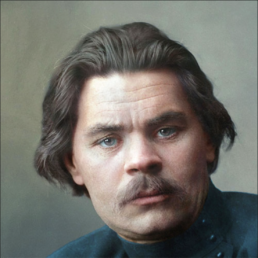These life stories may contain descriptions of childhood trauma and abuse, as well as images, voices and names of people now deceased. If you need help, you can find contact details for some relevant support services on our support page.
Russian writer, Maxim Gorky (1868-1936), spent much of his childhood in kinship care.
Gorky, born Alexei Maximovich Peshkov, was seven when he first went to live with his working-class grandparents in Nizhny Novgorod after his father died.
Alexei’s grandfather was a physically violent man, beating up his wife, his sons (who were in turn violent with their wives), and his grandsons. Alexei was once beaten unconscious by his grandfather when he tried to protect his beloved grandmother from her husband’s wrath.
Alexei’s grandmother became the sole source of kindness in his childhood, treating him well and telling him endless folk stories.
Her words were like music and like flowers. They bloom in my memory like everlasting blossoms. I remember her smile as a dilation of her large eyes and a cheerful flash of her white teeth that gave her face an inexpressible charm. Despite her wrinkles and her weathered complexion she looked young and even glowing. All that spoiled her appearance was her bulbous, red nose with its splayed-out nostrils, the result of a weakness for drink and her snuff-taking…(Gorky, 8).
Alexei’s mother refused to stay in her parents’ house but at one point she returned and took the boy to live with her and the violent man she had married. Again, Alexei tried to intervene and protect his mother, but his mother—worn down by violence and poverty—took to beating the child too.
Alexei was eleven when his mother died and he went back to his grandparents. Not long after Alexei’s grandfather sent him out to work. It was whilst working on a steamer travelling the Volga that a cook taught Alexei to read, a hobby that became a lifelong passion.
The harsh nature of his childhood, working for abusive employers whilst staving and poorly clothed, prompted Alexei to adopt the pseudonym Gorky, which means ‘bitter.’
19th century Russia from Gorky’s perspective was vicious, mean, and impoverished, a placed that constantly puzzled Alexei, particularly as he contrasted the people he knew, who loved to humiliate and torment each other, with the characters in books he read. What he found particularly difficult was the treatment of women.
What disturbed me most at the time was the common masculine attitude toward women. From my reading I had come to look upon women as all that give life beauty and meaning. Grandma had nourished this in me with her accounts of Madonna and the wise Saint Natalie, the laundress, and by those countless smiles and loving looks with which women, the source of life, offset this sordid existence (Gorky, 420).
Maxim Gorky published his first story Makar Chudra in a provincial press in 1892. He became involved with and financially supported the Marxist Bolshevik Party (later the Communist Party of the Soviet Union) in 1905 – by then he was living in St Petersburg – and helped to organise their first newspaper and the Moscow uprising or the First Russian Revolution.
Gorky left Russia as a political exile in 1906. He lived in Capri, Italy, primarily, before returning to Russia in 1913 where he opposed Lenin and financially supported imprisoned writers.
Maxim Gorky wrote numerous stories, plays, and novels. What is regarded as his finest work, his three-volume autobiography, was published from 1915; he completed it while again living in Italy.
Gorky was nominated five times for the Nobel Prize in Literature. He was given the posthumous honour of being canonized as the patron saint of Soviet letters, although Ronald Hingley argues this is in large part because Gorky had lived in such extreme poverty as a child and youth that he is “considered the greatest “proletarian” in Russian literature.”
In 2008, Ariette Taylor directed Gorky’s play, The Lower Depths (1902), in Melbourne. The play, which was first produced in Moscow in 1902, provides a taste of what life is like for those at the bottom of the social ladder.
References:
Gorky, Maxim. Autobiography of Maxim Gorky. Amsterdam: Fredonia Books, 2001.
Hingley, Ronald. “Maxim Gorky”. Britannica. https://www.britannica.com/biography/Maxim-Gorky
Image available here.
